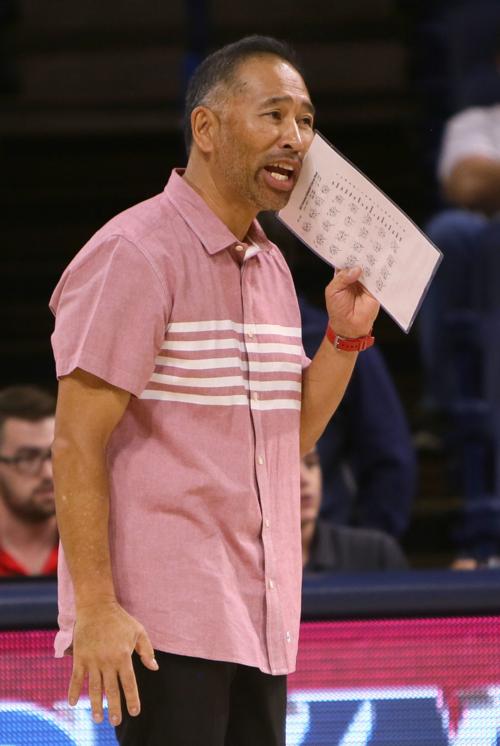Dave Rubio has never been one to shy away from tough conversations.
So when the killing of George Floyd by a Minneapolis police officer led to protests and a new national debate about race and police violence, the Arizona Wildcats’ longtime volleyball coach both talked and listened.
The result? “When people talk about Black Lives Matter, I have a much greater sense of what that is now than I used to,” Rubio said.
“I think the general reaction from people who are not African American is like, ‘I shouldn’t feel bad for growing up white, or I shouldn’t feel bad for growing up and having a stable, good job, and I’ve earned …’ and that’s not the point,” he added. “That’s not the point — that’s the thing I finally got.”
Things became “much clearer,” he said, because of the visuals coming from his television. Floyd’s death, captured on cellphone video and watched millions of times, lit a fire under the nation, Rubio said.
The coach said his thoughts went to longtime UA assistant Rita Stubbs, who had shared some of her experiences as a black woman with him before.
“Rita has mentioned about things about her driving in Tucson, her husband driving and worried about her husband being pulled over for no reason. And worried that he could — because he’s a large man— that he could be viewed as a threat, and then the same thing that happened to George Floyd could happen to her husband,” Rubio said.
“She’s stated cases when she was in North Carolina being pulled over for no reason. Then having a conversation with your kids about when you get pulled over, make sure that you do these things so you don’t put yourself in a position to be harassed or (have) some excessive force used on you. I really thought about those things much deeper than I ever had.”
Mother was interned
Rubio is half-Japanese and half-Filipino, making him the only Pac-12 volleyball coach of color. He never thought much about that until recently.
“I’m probably much different than a lot of people: Even though I’m a minority — I’m an Asian — I have experienced very little discrimination in my life,” he said.
But Rubio’s mom, Shirley, has. Recently, she talked to her son about some of the things she experienced. At age 5, she was put into a Japanese-American internment camp in Arizona. After the war, her family moved to Chicago in an attempt to escape discrimination.
“Before they were interned, they were living in California — I forget which part of Southern California, a Japanese community — and then afterwards, they didn’t want to go back to California because they felt they were going to experience too much racism, too much discrimination,” Rubio said. “Which of course, it didn’t matter where they went, they experienced that.”
Rubio’s mother eventually moved back to California, attending UCLA.
The discrimination hit much closer to home when she met and eventually married Rubio’s father, who was Filipino. Relations between the two nations were fractured in World War II when the Japanese, after bombing Pearl Harbor, immediately attacked the Philippines.
“Back then in the ’60s, or in the ’50s, when my mom met my father, you can imagine the two families were not too happy about that,” he said.
“I know that my grandfather — her father — disowned her. Not a lot of great memories with that. I think there are some things that when we talked, that are hard for her. … The ’60s were a lot like what’s going on right now. All the rioting and discrimination that was going on. It’s all come full circle.”
Players returning
Arizona’s returning volleyball players are scheduled to return to campus July 5, with the freshmen due a week later. Preseason practice starts Aug. 10.
The Wildcats will be spending a month on strength and conditioning before practice can begin.
Rubio is happy to be back on schedule but faces more questions than ever. How many people can be in the building working together at the same time? How will they social-distance on the court? What is the exact process for switching out balls to disinfect them after they’ve been used? What if the precautions and protocols at other schools aren’t as stringent as Arizona’s?
“I haven’t quite got my arms wrapped around what we’re going to do,” he said. “There’s so many questions out there with very few answers,” Rubio said. “I think at the end of the day, everybody understands that this is a very inexact science.”
Busy days
Rubio and his staff spent much of the past week recruiting. Stubbs contacted recruits for the class of 2022 via email right at 12:01 a.m. on the first day recruiting could begin. In the first few days, Rubio estimated he and Stubbs talked to a few dozen prospects.
Rubio can’t talk specifically about his 2021 class, which will sign in November — though he said it’s locked up. One of the verbal commits is his daughter, Olivia, who will be a senior this fall at Catalina Foothills High School. Olivia Rubio is an outside hitter who had 148 kills and 213 digs last season.
Rubio is also in the midst of hiring an assistant coach to replace Gregg Whitis, who stepped down in April for personal reasons. He has narrowed down the field of applicants and will start interviewing candidates shortly.





